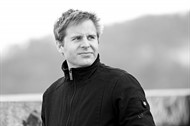| Country | Czech Republic |
|---|
| Occupation | Arranger, Composer, Conductor, Performer, Teacher |
|---|
| Categories | Aleatoric, Contemporary, Electronic, Experimental Music, Electroacoustic Music |
|---|
Tomas Palka (born in Brno on 21 February 1978) studied composition under Pavel Zemek at Brno Conservatory, and then at the Music Faculty of the Academy of Performing Arts in Prague under Marek Kopelent, and later for a doctorate under Milan Slavicky. He is the cofounder and chairman of the Prague-based Konvergence Composer Association, with which he has contributed to performances of works by young composers from around the world since 2002.
He has taken part in a number of composition courses in Cesky Krumlov (Michael Finissy, Guy Reibel, Philippe Manoury, Martin Smolka, Lasse Thoressen, Helmut Oehring, Xiaoyong Chen), and in 2004 attended a course in Dartington in the United Kingdom. In the same year the French copyright association SACEM invited him for a residential stay in Paris.
He works on composition on a freelance basis, as well as producing works for the theatre or movie and teaching composition and music theory at English College Prague. Recently he has increasingly sought to include elements from outside music in his art: stagecraft and lighting, work with word and movement, or collaboration with visual art, including conceptual arts.
Palka’s compositions draw from his work outside music and are often inspired by spiritual meanings, which are projected into the structure and content of his compositions which are subtle, introvert and contemplative. He uses many unconventional instrumentation techniques and exploits the contrasts they form with the content. As far as the formal structure is concerned he favours a monolithic form, the development of contrasts within a longer passage, and the links between the blocks of music.
